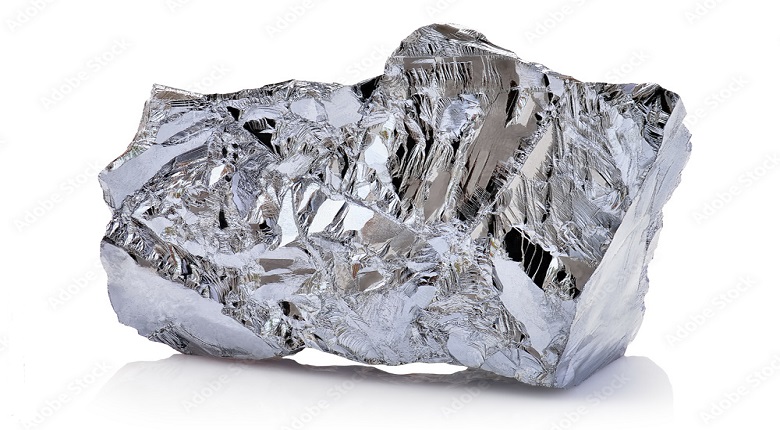The production process along with the key market players have been illustratively touched upon. The nickel pricing trajectory and recent developments impacting the market have also been studied in this blog.
Nickel Market Overview and Demand
Nickel with the symbol Ni is a transition metal which is the fourth period/row element of the periodic table.
The element has the atomic number 28 and an atomic mass of 58.693 g/mol. It has a density of (g cm−3) 8.90. Its respective melting and boiling points are 1455°C,/2651°F/1728 K and 2913°C/5275°F/3186 K. It has a solid state at 20°C. It is a silvery metal that is resistant to corrosion, even at elevated temperatures. It has many properties like being hard, ductile, malleable and a good heat and electricity conductor. It slowly dissolves in dilute acids such as iron.
Nickel is employed extensively to make coins and wires. In gas turbines and rocket engines, it is used to resist corrosion under high temperatures. It’s also employed for making many alloys like stainless steel that are used further to make armour plating, nails, or pipes. It is very easy to work with and can be drawn into wire and is also included in batteries, including rechargeable nickel-cadmium batteries and nickel-metal hydride batteries. Also, finely divided nickel works like a catalyst for hydrogenating vegetable oils.
Nickel Production Cost Study
- From Sulphide Ore: The production of nickel is done from sulfidic ore, which is placed in a pre-heated oxygen-containing furnace. Around 45% of nickel is made via the smelting of ore. In this step, oxygen is injected to get rid of all iron and sulfide traces. In order to refine nickel matte, the fluid bed roasting technique is used to give 95% purity.
- From Lateritic Ore: The production of nickel takes place from lateritic ores. From these ores, nickel is mined via extractive metallurgy. The extraction occurs using the roasting method that gets rid of moisture. In the following step, the reduction furnace eliminates chemically bound water and nickel oxide. In order to finally refine nickel matte that gives 95% purity, the fluid bed roasting technique is employed.
Prominent Players in the Nickel Market
- Umicore N.V
- American Elements
- Vale S.A.
- MMC Norilsk Nickel PJSC
- Jinchuan Group International Resources Co. Ltd
- Glencore plc
- PT Timah (Persero) Tbk
Nickel Price Trend Forecast and Movement
-
North America
Recent prices for nickel displayed a mixed trend in the US market amidst the growing recession worries. As per the key market players, the prices of LME three-month nickel stayed under stress, and trading activity was comparatively steady. As per producers, the recent demand outlook stayed flat; they still saw client orders for nickel during the later period. But, the market situation was extremely volatile during the period with people not willing to commit beyond a limited time span. Even though sources indicated periodic cuts in steel production for a little while, closures reports, as well as whispers of further suspensions, had yet to shock nickel markets. There was a decrease because of some mills taking a break; however, this is a result of electricity prices and not because of demand. As per traders, it is challenging to anticipate where nickel prices and premiums will head in the market.
-
Asia Pacific
Prices of Nickel in the Chinese market saw a mixed trend recently amid growing interest rates as well as a strong US dollar index. Prices of nonferrous metal are under stress because of the Fed’s tight monetary policy. In addition, the plants stockpiled high-priced nickel ore inventories earlier; hence, they lowered production to cut losses. In contrast, the macro situation heavily influenced the prices of nickel, and the fundamentals were weak, so the prices are expected to stay volatile. As a result of frail demand and growing inventory, prices of nickel acquired inadequate fundamental support. In spite of a little recovery in spot premiums, spot trading improved significantly. Prices of ore are not likely to drop as the rainy season approaches and the market for stainless steel restarts production.
-
Europe
Prices of Nickel in the European market saw a mixed pricing trend amid surging prices of energy. As per the industry players, prices of nickel dropped recently in spite of anticipated seasonality. Due to the elevated prices of raw materials and economic tensions, global nickel demand from the stainless-steel sector stayed frail and sluggish. The latter comprise all-time-high prices of energy and sea freight. Whilst skyrocketing prices of energy pushed brief production cuts across many steel mills in Europe, including the ones in the stainless sector, the assumption of further slashes spread amongst the nickel market players. As a consequence, downstream nickel demand stayed somewhat steady, but the market remained highly volatile.
Latest Development in the Industry
UK Regulator Launched An Investigation For LME Nickel Trading Halt
A British financial guard announced its initial investigation of a UK exchange regarding potential misconduct following the decision by the London Metal Exchange last year to halt nickel trading.
Although it wasn’t unclear whether the investigation would look into the controversial choice by the exchange for cancelling billions of dollars of trades.
The largest and oldest metals market in the world rejected all nickel trading activity last year in March following volatile price action and stopped trading for the first time since 1988.
The suspension took place after the costs doubled to over $100,000 a tonne in a few hours in a wave of sources accused of short-covering by the leading producer in the world.
According to the write-up, including the nickel metal and its industry overview, the commodity is extremely crucial with applications across many end-user industries which makes its procurement vital. Hence, the market experts can follow up with the blog and gain insight into the current market situation and its supply-demand dynamics, which can help them gain a competitive edge over their industry competitors.
